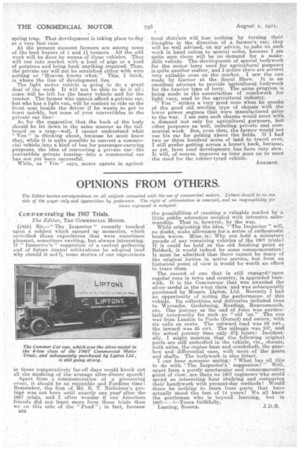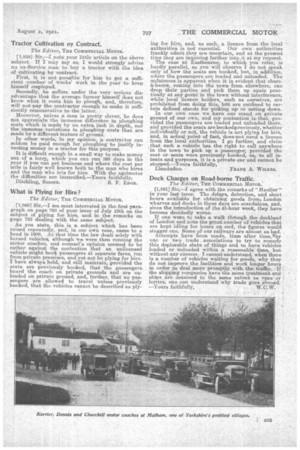OPINIONS FROM OTHERS.
Page 30

Page 31

If you've noticed an error in this article please click here to report it so we can fix it.
The Editor invites correspondence on all subjects connected with the use of commercial motors. Leiters should be on one side of the paper clay and typewritten by preference. The right of abbreviation. is reserved, and no responsrbility for views expressed is accepted.
Ccrrivetrerating the 1907 Trials.
The Editor, TEE COMMERCIAL MOTOR.
[ism] Sir,—" The Inspector " recently touched upon a subject which opened up memories, which revivified those experiences that were sometimes pleasant, sometimes exciting, but always interesting. If " Inspector's " suggestion of a central gathering and of future annual celebrations be adapted (and why should it not ?), some stories of our experiences
in those comparatively far-off days. would knock out all the misfiring of the average after-dinner speech! Apart from a commemoration of a pioneering event, it should be an enjoyable and Fordless time ! Remember, the first of Mr. R. T. Nicholson's protege was not born until exactly one yea'e after the 1807 trials, and I. often wonder if our American friends. did not learn more from, those. trials than we on this side of the "Pond"; in fact, foresaw B34 the possibilities of creating a valuable market by a little public education coupled with intensive sales manship. That is„ however, by the . way. .
While originating the idea, The Inspector" will, no doubt, make allowance for, a series of enthusiastic brain waves. Mine is: Why not hold a miniature parade of any remaining vehicles of the 1907 trials,? If it could be held at the,old finishing point at Baldock, it would indeed be some commemoration! It must be admitted; that there cannot be many of the original lorries in active service, but from an historical -point of view it would ba worth an effort to trace them.
The record of one that. is still engaged?upon regular runs in town and country, is appended' herewith. It is the Commerear that was awarded the silver medal in the 4-ton class, and was subsequently purchased by Messrs. Lipton, Lo. Recently I had an opportunity of noting the performance of this vehicle. Its collections and deliveries included, runs to Wycombe, Godalming, Reading; Bournemouth, etc. One journey at the end of June Was particularly noteworthy for such an "old Tun." The ruu. was limn London to Poole (Dorset) and return,' with six calls en route. The outward load was 82 cwt.,: the inward was 25 cwt. The mileage was 2472' and the actual journey . time only. 27i. hours! Incidentally, I might mention that the following original parts are still embodied in the vehicle, viz., chassis,. both axles, the engine base and crankshaft, the gearbox and . differential case, with most of the gears. and shafts. The bodywork in also -intact .• . • • ; I can hear, someone saying: "What has all this to do with .` The Inspector's.' suggestion?" Well,apart from a purely spectacular and commemorative point of view' are there, no 1907 engineers who eould spend an interesting hour studying, and comparing their hanclywork with present-day methods? Would there be nothing to learn from -parts that have actually stood the test of 14 years? We. all know. the gentleman who is beyond learning, but 'in 1907—!—Yours faithfully,
. Lancing, Sussex. J.D.R.
Tractor Cultivation oy Contract.
The Editor, THE COMMERCIAL MOTOR.
[1,859] Sir,--I note your little 'article on the above subject.If I may say so, I would strongly advise no ex-Service man to buy a tractor with the idea of cultivating by contract.
First, it is not possible for him to get a sufficient number of weeks' work in the year to keep himself employed.
Secondly, -he suffers under the very serious disadvantage that the average farmer himself does not know what it costs him to plough, and, therefore, will not pay the contractor enough to make it sefllciently remunerative to the latter.
Moreover, unless a man is pretty clever, he does not appreciate the immense difference in ploughing costs which is made by an extra inch in depth, nor the immense variations in ploughing costs that are made by a different texture of ground.
In other words, in my opinion, a contractor can seldom be paid enough for ploughing to justify investing money in a. tractor for this. purpose.
It is difficult enough in a small way to make money out of a lorry, which you can run 365 days. in the year if you can get business and where the cost per mile is fairly well known both to the man who hires and the man who lets for hire. With the agrimotor the difficulties are intensified.—Yours faithfully,
Ditchling, Sussex. S. F. EDGE.
What is Plying for Hire ?
The Editor, THE COMMERCIAL MOTOR.
[1,860] Sir,—I am most interested in the first paragraph on page 706 of your issue of July 19th on the subject of plying for hire, and in the remarks on page 723 dealing with the same subject.
As you state, this is a subject which has been raised repeatedly, and, in our own ease, came to a head in 1906. At that time the law dealt solely with
horsed vehicles, although we were then running the•motor coaches, and counsel's opinion seemed to be
rather against the contention that an unlicensed vehicle might book passengers at separate fares, run from private premises, and yet not be plying for hire. I have always held, and still maintain, provided the seats are previously booked, that the passengers. board the coach on private grounds and are unloaded on private ground, and, further, that no passengers are allowed to travel unless 'previously booked, that the vehicles cannot be described as ply ing for hire, and, as such, a licence from the local authorities is not essential. Our own. authorities frankly admit they are uncertain, and at the present time they are inquiring further into it at my request.
The case at Eastbourne, to which you refer, is hardly parallel, as you will observe I do not speak only of how the seats are booked, but, in addition, where the passengers are loaded and unloaded. The unfairness is apparent when it is evident that charsk-bancs, coming, into the town from elsewhere, can drop their parties and pick them up again practically at any point in the town without interference, while local licence holders, such as ourselves, are prohibited from doing this, bilt are confined to certain defined stands for picking up or setting down. In our own case we have our stand on private ground of our own, and my contention is that, provided the passengers are loaded and unloaded there. and provided the seats are bookedpreviously, whether individually or not, the vehicle is not plying for hire, and, in actual point of fact, does\not need a. licence from the local authorities. I go further, and claim that such a vehicle has the right to call anywhere in the town. to pick up. a passenger, provided the seat or seats were previously booked, as, to all intents and purposes, it is a private car and cannot be stopped.—Yours faithfully,
Llandudno.
FRANK A. WILKES.
Dock Charges on Road-borne Traffic.
The Editor, THE COMMERCIAL MOTOR.'
[1,861] Sir, --I agree with the remarks of "Haulier" in your last issue. The delays, detention, and short hours available for obtaining goods from; London wharves and docks in these days are scandalous, and, since the introduction of the 48-hour Week, they have become decidedly worse.
If one were to take a. walk through the dcickland of London and note the great number of vehicles that are kept idling for hours on end, the figures would stagger one. Some pf-our railways are almost as bad.
Attempts have been made, time after time,lby one or two trade associations to try •to remedy this deplorable state of things and to have vehicles loaded or unloaded within a reasonable time' but without any success. I cannot understand, when there is a number of vehicles waiting for goods, why they do not improve tho facilities and work longer hours in order te deal more promptly with the, traffic. If the shipping companies have the same treatment and ships are detained to the same extent as vans • or lorries, one can understand why trade goes abroad.
—Yours faithfully, W.O.W.


































